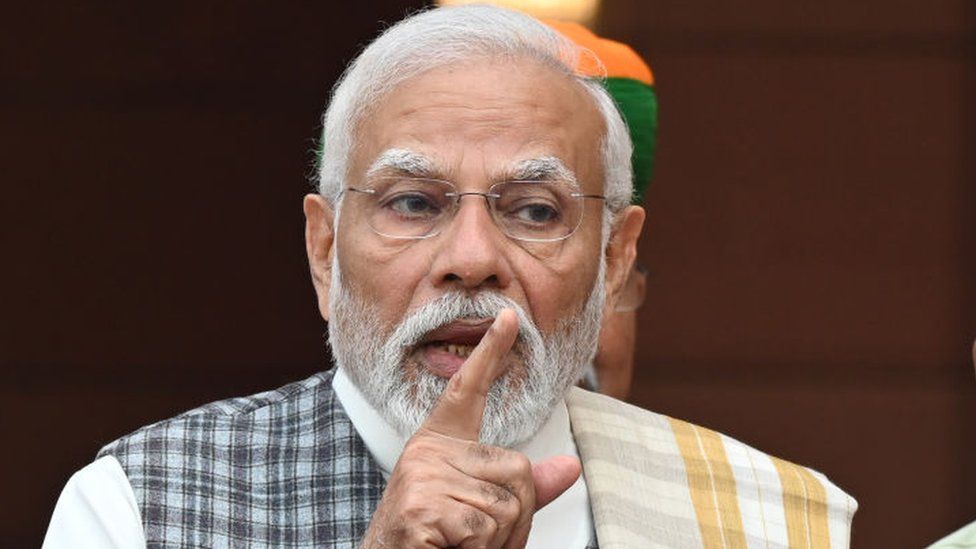PM Modi reads out Jawaharlal Nehru's letter in Rajya Sabha, alleging Nehru's opposition to reservation policies and criticizing Congress for undermining BR Ambedkar's ideas.

राज्यसभा सत्र के दौरान एक अच्छे क्षण में, प्रधान मंत्री नरेंद्र मोदी ने एक बार फिर पूर्व प्रधान मंत्री जवाहरलाल नेहरू की ओर शिकायत की, और उन्हें "आरक्षण विरोधी" बताया। पीएम मोदी ने नेहरू के नाम से लिखे गए एक पत्र को पढ़ने के लिए चुना, जिसमें सम्मानित नेता ने आरक्षण नियमों पर जोरदार विरोध व्यक्त किया, जिसमें कौशल अक्षमता और शासन संरचनाओं के भीतर निम्न मानकों के रखरखाव के मुद्दों का उल्लेख किया गया था। प्रधान मंत्री की टिप्पणियों ने सदन के भीतर एक जीवंत बहस छेड़ दी, आरक्षण की विवादास्पद समस्या और सामाजिक न्याय और न्यायसंगत प्रतिनिधित्व के लिए इसके निहितार्थ पर चर्चा को और तेज कर दिया।
पीएम मोदी की घोषणा, आरक्षण नियमों पर कांग्रेस पार्टी के ऐतिहासिक रुख की तीखी आलोचना के साथ, भारत के लोकतांत्रिक ढांचे के भीतर सामाजिक और राजनीतिक विचारधारा के व्यापक विषयों पर प्रकाश डालती है। डॉ. बी.आर. की विरासत का आह्वान करके। भारतीय संविधान के निर्माता और हाशिए पर मौजूद समूहों के अधिकारों के लिए अथक सुझाव देने वाले अंबेडकर के नेतृत्व में पीएम मोदी ने समावेशी शासन के महत्व और सामाजिक न्याय के मानकों को बनाए रखने के महत्व को रेखांकित करने की कोशिश की।
इसके अलावा, पीएम मोदी की कहानी ने उनकी सरकार को समावेशिता और प्रगति के चैंपियन के रूप में स्थापित करने की मांग की, जिसमें हाशिए पर रहने वाले समुदायों को सशक्त बनाने और राष्ट्रपति पद के उच्चतम क्षेत्रों में अधिक प्रतिनिधित्व को बढ़ावा देने के उद्देश्य से प्रमुख परियोजनाओं पर प्रकाश डाला गया। एक आदिवासी बेटी को भारत का राष्ट्रपति नियुक्त करने से लेकर डॉ. बी.आर. को प्रतिष्ठित भारत रत्न प्रदान करने तक। अंबेडकर, पीएम मोदी ने भारतीय समाज की सामग्री पर उनके प्रबंधन की नीतियों के परिवर्तनकारी प्रभाव को रेखांकित किया।
हालाँकि, राजनीतिक बयानबाजी और वैचारिक बहस के बीच, पीएम मोदी की टिप्पणियों ने जवाहरलाल नेहरू की जटिल विरासत और भारत के सामाजिक-राजनीतिक परिदृश्य को आकार देने में कांग्रेस पार्टी की स्थिति के बारे में चर्चा फिर से शुरू कर दी। आरक्षण पर नेहरू के कथित विचारों को सामाजिक न्याय पर आधुनिक प्रवचन के साथ जोड़कर, पीएम मोदी ने प्रचलित आख्यानों को चुनौती देने और अपनी सरकार के समावेशी विकास और न्यायसंगत वृद्धि के एजेंडे के लिए सहायता को प्रेरित करने की कोशिश की।
संक्षेप में, पूरे राज्यसभा सत्र के दौरान पीएम मोदी के हस्तक्षेप ने सामाजिक न्याय के विचारों, प्रमुख ऐतिहासिक शख्सियतों की विरासत और भारत की लोकतांत्रिक यात्रा के भाग्य प्रक्षेप पथ पर व्यापक चिंतन के लिए उत्प्रेरक के रूप में कार्य किया। जैसे-जैसे देश गंभीर सामाजिक-आर्थिक मांग वाली स्थितियों से जूझ रहा है और अतिरिक्त समावेशिता के करीब पहुंचने का प्रयास कर रहा है, पीएम मोदी के शब्द एकजुटता, प्रगति और सामूहिक आंदोलन के स्पष्ट आह्वान के रूप में गूंज रहे हैं।
In a good sized moment throughout the Rajya Sabha session, Prime Minister Narendra Modi all over again directed complaint in the direction of former Prime Minister Jawaharlal Nehru, characterizing him as "anti-reservation." PM Modi selected to study aloud a letter attributed to Nehru, in which the respected leader expressed vehement competition to reservation rules, mentioning issues approximately ability inefficiency and the upkeep of lower requirements inside governance structures. The Prime Minister's remarks stirred a lively debate within the chamber, further fueling discussions across the contentious trouble of reservation and its implications for social justice and equitable representation.
PM Modi's announcement, coupled together with his pointed critique of the Congress celebration's historic stance on reservation regulations, shed light on broader subject matters of social and political ideology inside India's democratic framework. By invoking the legacy of Dr. B.R. Ambedkar, the architect of the Indian Constitution and a tireless suggest for the rights of marginalized groups, PM Modi sought to underscore the significance of inclusive governance and the vital of upholding the standards of social justice.
Moreover, PM Modi's narrative sought to position his authorities as a champion of inclusivity and progress, highlighting key projects aimed toward empowering marginalized communities and fostering more illustration in the maximum echelons of presidency. From appointing an Adivasi daughter as the President of India to conferring the distinguished Bharat Ratna upon Dr. B.R. Ambedkar, PM Modi underscored the transformative effect of his management's policies on the material of Indian society.
However, amidst the political rhetoric and ideological debates, PM Modi's comments additionally reignited discussions around the complicated legacy of Jawaharlal Nehru and the position of the Congress party in shaping India's socio-political panorama. By juxtaposing Nehru's purported views on reservation with the modern-day discourse on social justice, PM Modi sought to challenge prevailing narratives and provoke aid for his authorities's agenda of inclusive development and equitable increase.
In essence, PM Modi's intervention all through the Rajya Sabha session served as a catalyst for broader reflections on the ideas of social justice, the legacy of key historic figures, and the destiny trajectory of India's democratic journey. As the nation grapples with pressing socio-economic demanding situations and strives closer to extra inclusivity, PM Modi's phrases reverberate as a clarion call for solidarity, progress, and collective movement.